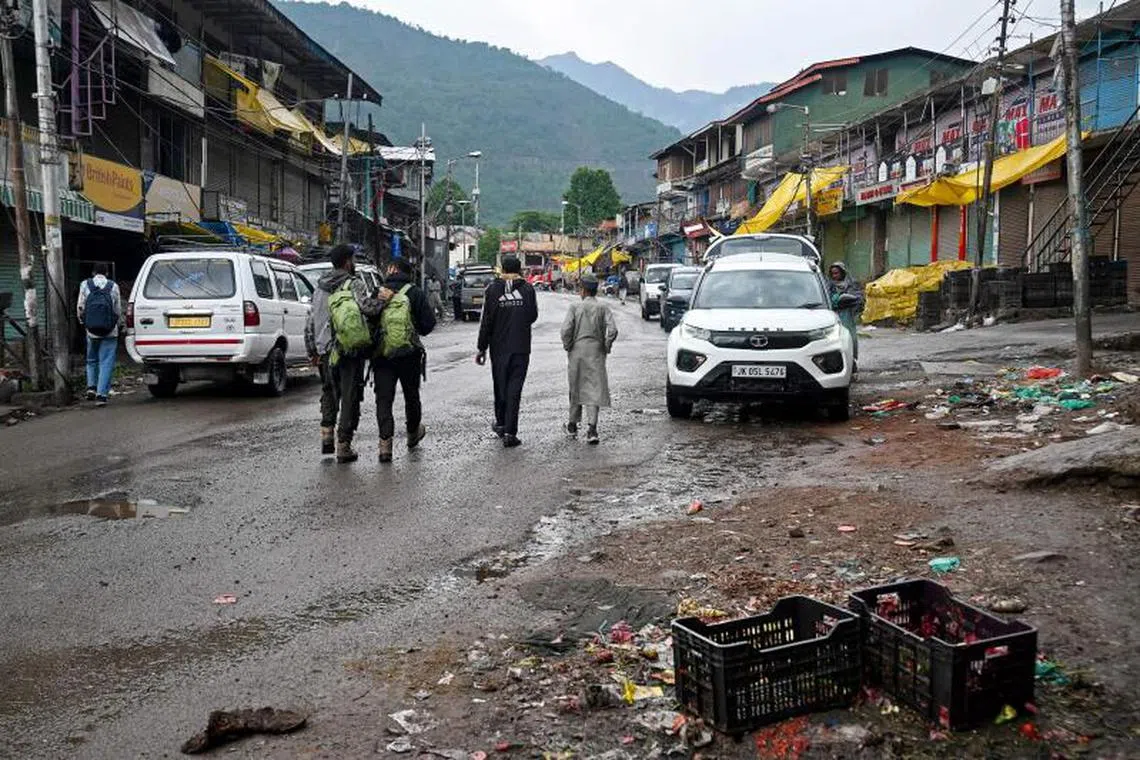Indian military warns Pakistan against ceasefire violations
Sign up now: Get insights on Asia's fast-moving developments

Security personnel in the city of Jammu, in Indian-controlled Kashmir, on May 11.
PHOTO: ATUL LOKE/NYTIMES
NEW DELHI/ MUZAFFARABAD, Pakistan - The Indian military sent a “hotline message” to Pakistan on May 11 about violations of a ceasefire agreed upon this week and informed it of New Delhi’s intent to respond if it was repeated, a top Indian army officer said.
India’s Director-General of Military Operations (DGMO) was speaking as a fragile 24-hour-old ceasefire appeared to be holding after both sides blamed the other for initial violations
The truce announced on May 10 followed four days of intense fighting between the nuclear-armed neighbours. In the worst fighting in nearly three decades, they fired missiles and drones at each other’s military installations, killing almost 70 people.
Diplomacy and pressure from the United States helped secure the ceasefire deal
Blasts from air defence systems boomed in cities near the border under a blackout, similar to those heard during the previous two evenings, according to local authorities, residents and Reuters witnesses.
“Sometimes, these understandings take time to fructify, manifest on the ground,” Lieutenant-General Rajiv Ghai, the Indian DGMO, told a media briefing, referring to the truce. “The (Indian) armed forces were on a very, very high alert (yesterday) and continue to be in that state.”
The Indian army chief had given a mandate to its commanders to deal with “violations of any kind” from across the borders in the best way they deem fit, Lt-Gen Ghai added.
He said his Pakistani counterpart called him on the afternoon of May 10 and proposed that the two countries “cease hostilities” and urgently requested a ceasefire.
There was no immediate response to India’s comments from Pakistan. Late on May 10, the Pakistani Foreign Ministry had said that it was committed to the truce agreement and blamed India for the violations.
US President Donald Trump announced the ceasefire on May 10, saying it was reached after talks mediated by Washington.
US Secretary of State Marco Rubio said India and Pakistan had also agreed to start talks on “a broad set of issues at a neutral site”.
While Islamabad has thanked Washington for facilitating the ceasefire and welcomed Mr Trump’s offer to mediate on the Kashmir dispute with India, New Delhi has not commented on US involvement in the truce or talks at a neutral site.
India maintains that disputes with Pakistan have to be resolved directly by the two countries and rejects any third-party involvement.
On May 11, Mr Trump praised the leaders of both countries for agreeing to halt the aggression and said he would “substantially” increase trade with them.
Hindu-majority India and Muslim-majority Pakistan each rule a part of Kashmir but claim it in full, and have twice gone to war over the Himalayan region.
India blames Pakistan for an insurgency in its part of the territory, but Pakistan says it provides only moral, political and diplomatic support to Kashmiri separatists.
Picking up the pieces
Among those most affected by the fighting were residents on either side of the border, many of whom fled their homes when the fighting began on May 7, two weeks after a deadly attack in Indian Kashmir’s Pahalgam that India said was backed by Islamabad.
Pakistan has denied the accusation.

People walking past a market strewn with garbage as shops stayed closed in Uri, about 100km from Srinagar on May 11.
PHOTO: AFP
In the Indian border city of Amritsar, home to the Golden Temple revered by Sikhs, people returned to the streets on the morning of May 11 after a siren sounded to signal a return to normal activities following the tension of recent days.
Resident Satvir Singh Alhuwalia, 48, a shopkeeper in the city, said: “Ever since the terrorists attacked people in Pahalgam, we have been shutting our shops very early and there was an uncertainty. I am happy that at least there will be no bloodshed on both sides.”
In some border areas, however, people were asked not to return home just yet. In the Indian Kashmir city of Baramulla, the authorities warned residents to stay away due to the threat posed by unexploded munitions.
Mr Azam Chaudhry, 55, who fled his home in the Pakistani town of Khuiratta and has now been told to wait until May 12 before returning, said: “People here are hosting us well, but just as a bird feels at peace in its own nest, we also feel comfortable only in our own homes, even if they have been damaged.”
In Indian Kashmir’s Uri, a key power plant that was damaged in a Pakistani drone attack is still under repair.
An official from state-run NHPC, India’s biggest hydropower company, who did not want to be identified said: “The project has suffered minor damage... We have stopped generation as the transmission line has been damaged.” REUTERS


